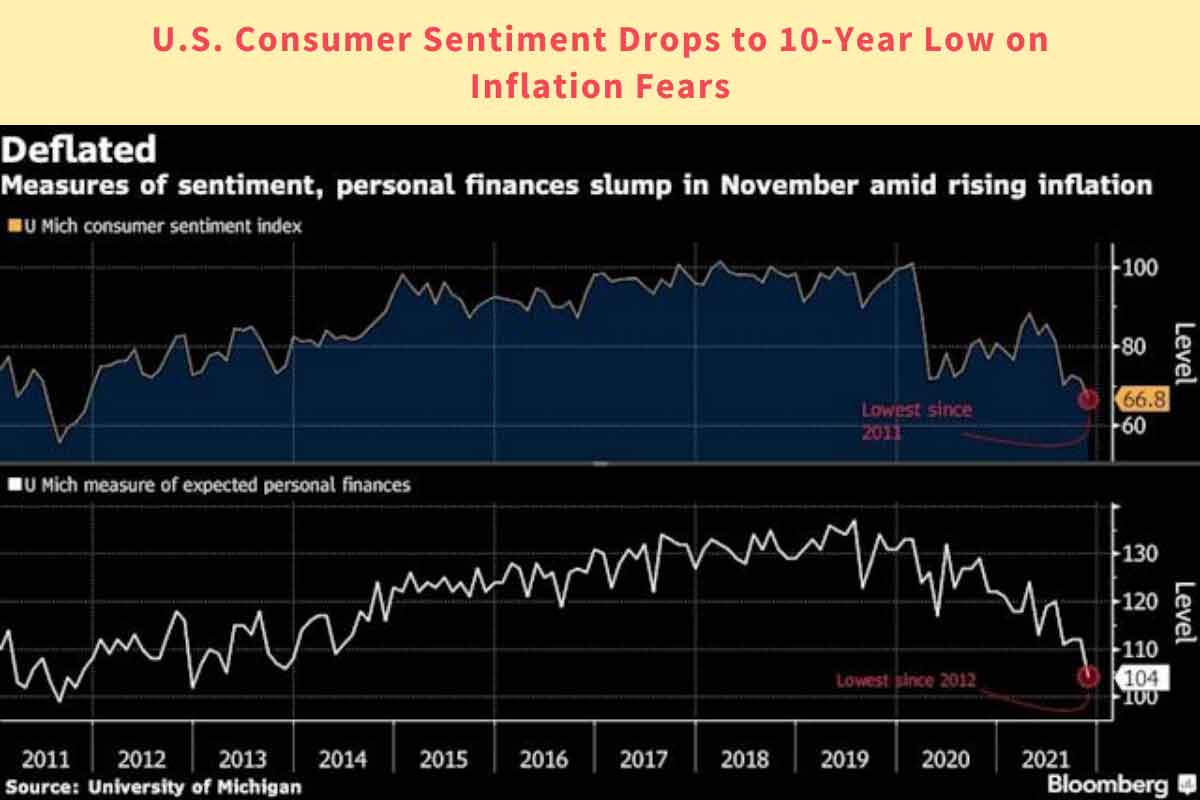In early November, U.S. consumer sentiment incredibly broke down due to increasing concerns of Americans about increasing prices and the inflationary effect upon their funds.
As per data released on 12th November, the University of Michigan’s preliminary sentiment index fell to 66.8 from 71.7 in October. The November figure ran down all anticipations in a Bloomberg survey of economists that forecasted a rise to 72.5.
No Effective Policies Have Been Developed Yet to Reduce Increasing Inflation
According to a statement made by the survey director Richard Curtin, Waning confidence depicts “an escalating inflation rate and the growing belief among consumers that no effective policies have yet been developed to reduce the damage from surging inflation.”
As per the report, it is further expected by consumers that inflation will rise to 4.9 percent over the next year which will be the highest since 2008. They believe prices will increase by 2.9 percent over the next five to ten years, unaffected from the earlier month.
IRS Is Releasing New Common Tax Deductions and Tax Brackets as Inflation Rises
Curtin said, “One in four consumers cited inflationary reductions in their living standards in November, with lower-income and older consumers voicing the greatest impact.”
50 Percent of Households Expect Declines in Inflation-adjusted Incomes
According to the data, nearly 50 percent of the families expect declines in inflation-adjusted incomes over the next year. The sentiment figures are based on the government data previously in the week that depicted the highest yearly inflation since the last three decades.
Whilst the consumers are getting more anxious about the effect on purchasing power due to inflation, family spending reflected signs of progressing during the end of the third quarter.
Trump Says ‘We’ll Be Back’ in Veterans Day Video Recorded in Room Resembling Oval Office
In a note, Bloomberg economist Eliza Winger said “Looking ahead, the risk is outsized, persistent price rises feed into the consumer-inflation psyche,” adding further “In the near term, shortages and prices should restrain inflation-adjusted spending.”
Political Effect
Earlier this week, in a statement, President Joe Biden said that taking into account the increasing inflation is a top priority since he goes through reducing approval ratings.
The Michigan figures reflected a steep divide along partisan lines. Sentiment in between Republicans dropped 17 points to the lowest on record whereas it slipped 5.3 points for Democrat respondents.
The Michigan report depicted the purchasing power for household goods has deteriorated widely, with a gauge getting to a reading of 78 that was the second-lowest in data back to 1978. There were repeated mentions in the survey of higher costs for vehicles, durable goods, and homes.
According to Curtin, 24 percent of families believe it will worsen by the coming year which is the highest since June 2008.
Owners of CNY Donut Shops Found Guilty of Not Reporting Over $2.8 Million to IRS
According to the survey, the gauge of present conditions came down to 73.2, the lowest since 2011. A measure of future anticipations fell to 62.8, which was the lowest since 2013.
Concerning the economy’s prospects over the coming five years, Americans also are more hopeless. The university’s gauge decreased to the weakest since 2011.
